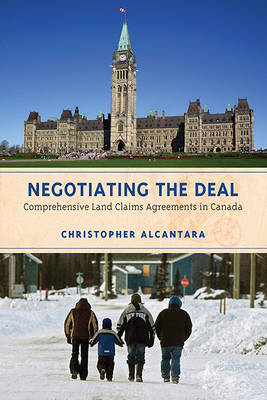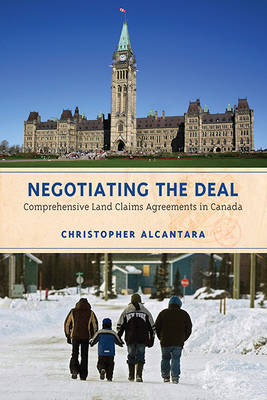
- Afhalen na 1 uur in een winkel met voorraad
- Gratis thuislevering in België vanaf € 30
- Ruim aanbod met 7 miljoen producten
- Afhalen na 1 uur in een winkel met voorraad
- Gratis thuislevering in België vanaf € 30
- Ruim aanbod met 7 miljoen producten
Negotiating the Deal
Comprehensive Land Claims Agreements in Canada
Christopher AlcantaraOmschrijving
This book provides the first systematic and comprehensive analysis of the factors that explain both completed and incomplete treaty negotiations between Aboriginal groups and the federal, provincial, and territorial governments of Canada. Since 1973, groups that have never signed treaties with the Crown have been invited to negotiate what the government calls "comprehensive land claims agreements," otherwise known as modern treaties, which formally transfer jurisdiction, ownership, and title over selected lands to Aboriginal signatories. Despite their importance, not all groups have completed such agreements - a situation that is problematic not only for governments but for Aboriginal groups interested in rebuilding their communities and economies.
Using in-depth interviews with Indigenous, federal, provincial, and territorial officials, Christopher Alcantara compares the experiences of four Aboriginal groups: the Kwanlin Dün First Nation (with a completed treaty) and the Kaska Nations (with incomplete negotiations) in Yukon Territory, and the Inuit (completed) and Innu (incomplete) in Newfoundland and Labrador. Based on the experiences of these groups, Alcantara argues that scholars and policymakers need to pay greater attention to the institutional framework governing treaty negotiations and, most importantly, to the active role that Aboriginal groups play in these processes.
Specificaties
Betrokkenen
- Auteur(s):
- Uitgeverij:
Inhoud
- Aantal bladzijden:
- 200
- Taal:
- Engels
Eigenschappen
- Productcode (EAN):
- 9781442612846
- Verschijningsdatum:
- 5/03/2013
- Uitvoering:
- Paperback
- Formaat:
- Trade paperback (VS)
- Afmetingen:
- 152 mm x 229 mm
- Gewicht:
- 272 g

Alleen bij Standaard Boekhandel
Beoordelingen
We publiceren alleen reviews die voldoen aan de voorwaarden voor reviews. Bekijk onze voorwaarden voor reviews.











